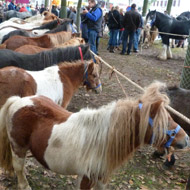Shetland ponies should not be indiscriminately exported from the UK under current Minimum Values legislation.
Present system may enable thousands of horses to be illegally trafficked each year
A 10 Minute Rule Bill, which calls for better protection for the UK's illegally trafficked horses, has been proposed by Greg Barker MP.
The Bill calls for the Animal and Plant Health Agency to be made the leading enforcement agency to stop illegal trafficking of possibly tens of thousands of Britain's horses to continental Europe, many of which may enter the food chain.
In his address to Parliament on Wednesday, MP for Bexhill and Battle, Mr Barker, said: “The UK can be proud of its laws that protect the welfare of every one of our country’s one million equines – including protecting them from indiscriminate export for slaughter. However, in reality horses and ponies can effectively be shipped anywhere, for any purpose, in any condition because there are no clear lines of responsibility for enforcement at our ports.
“My Bill would resolve this dysfunctional situation by 1) requiring the Secretary of State to commission and publish study of the effectiveness of enforcement of horse exports 2) making a single agency responsible for all animal exports and imports, including health, welfare and documentation – and mandate use of the Government Agency Intelligence Network to ensure close working with other enforcement agencies and NGOs to clamp down on the trade and ensure government receives its due revenue from tax, penalty fines and the Proceeds of Crime Act.”
World Horse Welfare estimate that a lorry full of 20 horses could be worth £10,000 at the meat markets, and that trafficking of 10,000 horses per year could fetch criminals around five million pounds.
The equine charity has been campaigning for an end to the suffering endured by thousands of horses transported long-distance across Europe to slaughter each year.
So far, pressure put on by the campaign has made significant progress, in that DEFRA now accepts that checks on horses should be made and that this would not disrupt free trade.
However, World Horse Welfare's chief executive, Roly Owers, explains that it does not go far enough: “Because so many lorries are travelling through our ports without being challenged the trade is largely undeterred. We have been providing the authorities with good quality intelligence for a number of years and relentlessly lobby for them to act on this information. With this in mind we are hugely grateful to The Rt. Hon. Greg Barker for asking for immediate action to help protect Britain’s horses.”
He adds: “In times of austerity this is not a question of spending more money but making better use of resources already being expended and liaising with the NGOs like World Horse Welfare who are able to offer valuable support.”
Image (C) World Horse Welfare







 The latest
The latest 
